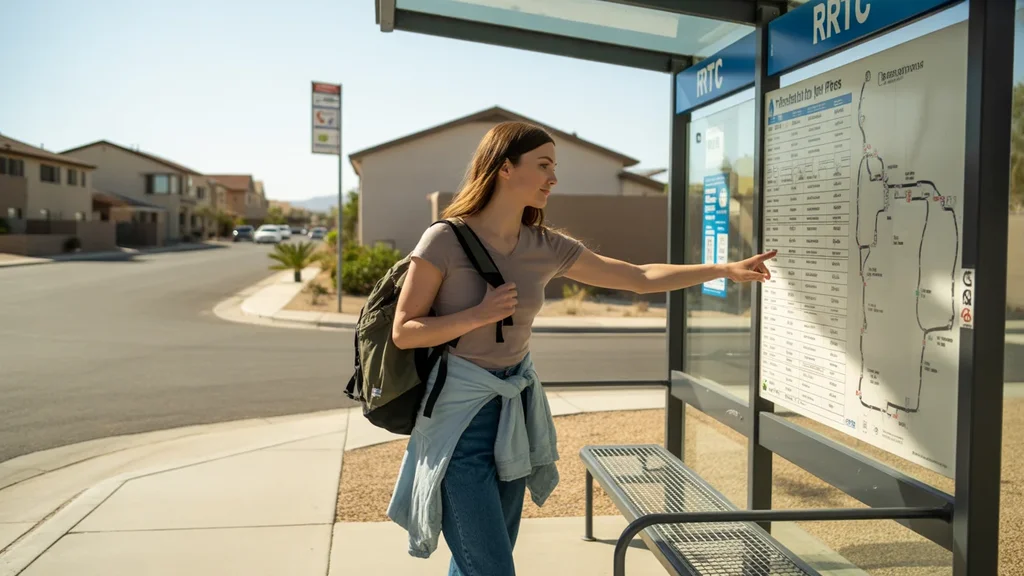What You’ll Spend on Transit in Las Vegas
When budgeting for life in Las Vegas, it’s important to factor in public transportation costs. As of 2025, a standard one-way bus fare in Las Vegas typically runs around $2.50. For regular commuters, investing in a monthly pass often provides the best value. A 30-day bus pass in Las Vegas typically costs $65.
Of course, your total monthly transit costs will depend on how frequently you ride and which modes you use. Light rail, express buses, and park-and-ride services may come with higher fares. But for most residents, budgeting $50-100 per month for transit passes is a smart starting point.
Transit Options Available

The primary public transportation provider in the Las Vegas metro area is the Regional Transportation Commission of Southern Nevada (RTC). Their system includes:
- RTC Transit buses – Local and express routes across the valley
- Las Vegas Monorail – Elevated line serving the Strip and convention center
- Paratransit and senior mobility services
- Park-and-ride facilities for suburban commuters
While Las Vegas doesn’t have an extensive rail network like some larger cities, the bus system provides good coverage of key neighborhoods and employment centers. The monorail is mainly used by tourists, but it can be handy for locals who work on the Strip.
Monthly Cost Breakdown
Let’s look at some common Las Vegas commuting scenarios and the estimated monthly transit costs for each:
| Commute Type | Monthly Cost |
|---|---|
| 5-day a week bus commuter | $65 (standard 30-day pass) |
| Weekend-only bus rider | $20 (two 24-hour passes) |
| Daily park-and-ride to the Strip | $100 (premium 30-day pass) |
🏆 Winner: For most Las Vegas locals, a standard RTC 30-day bus pass provides the best combination of flexibility and affordability. At just $65 per month, it’s a cost-effective alternative to driving for daily commutes.
Is Public Transit Worth It in Las Vegas?
Las Vegas has a reputation as a driving city, but rising gas prices and parking rates are making public transportation an increasingly attractive option. The average bus commute in Las Vegas takes about 30-40 minutes, which is comparable to driving in rush hour traffic.
When you factor in the costs of car ownership, including insurance, maintenance, and parking, taking transit can mean significant monthly savings. However, bus frequency and route coverage vary across the metro area, so it’s important to check schedules and stop locations for your specific commute.
Ways to Save on Transit
If you’re looking to trim your transportation budget, there are several ways to save on RTC fares:
- Youth, senior, veteran, and disability discounts
- Employer-sponsored transit passes
- Tax-advantaged commuter benefit cards
- Subsidized passes for qualified low-income riders
Many Las Vegas colleges also provide reduced-fare transit passes for students, so be sure to ask about your options.
FAQs
What is the cheapest way to get around Las Vegas?
For visitors and occasional riders, walking and taking the monorail along the Strip are affordable options. For commuters, RTC buses provide the most economical way to get around the valley.
Are there monthly transit passes in Las Vegas?
Yes, the RTC offers 15-day and 30-day passes for buses and the monorail. As of 2025, a standard 30-day bus pass costs $65.
Is public transit reliable for work commutes?
It depends on your location and route, but many Las Vegas residents use RTC buses to commute to work on the Strip or in downtown. Buses generally run every 15-30 minutes on major routes during peak times.
Getting Around Smarter in Las Vegas
As Las Vegas continues to grow, public transportation is becoming a more convenient and cost-effective option for many residents. While a car is still a necessity for some lifestyles and neighborhoods, the RTC network provides a viable alternative for many common commutes and errands.
By taking advantage of monthly passes and discount programs, savvy locals can keep their transit costs under $100 per month while avoiding the hassles of traffic and parking. To see how transit fits into your bigger financial picture, check out these monthly budget examples for Las Vegas residents.
